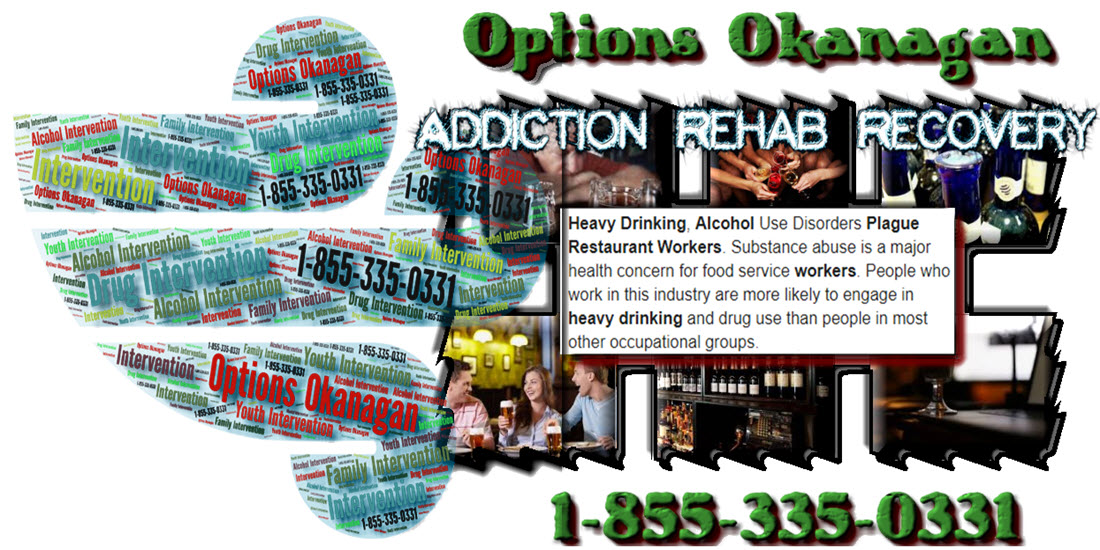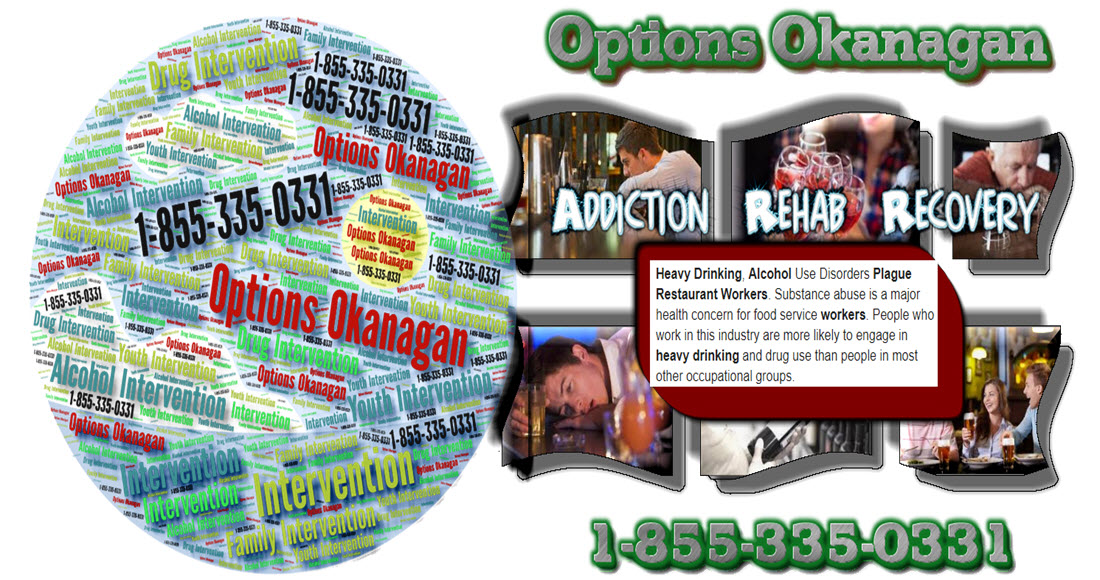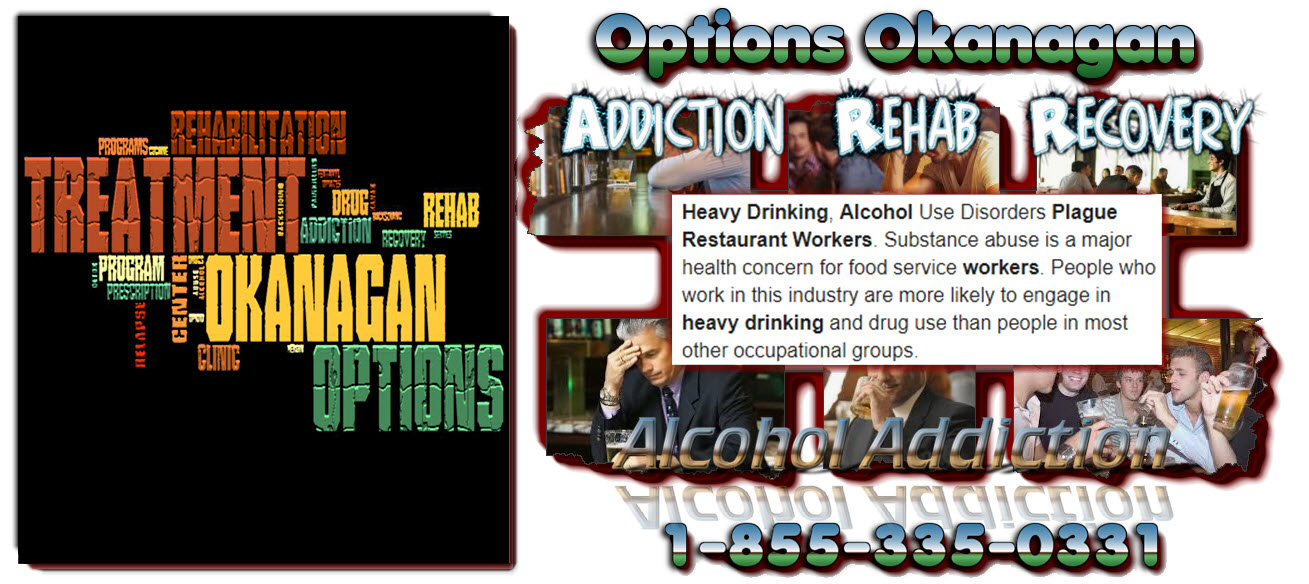Alcohol use disorders or (AUD) plus chronic heavy drinking are plaguing restaurant workers in BC and Alberta. Opioid drug and alcohol rehabilitation Treatment Centers in British Columbia and Alberta – Options Treatment Center in Kelowna, British Columbia treating drug and alcohol addiction and recovery.
Alcohol Rehabs In B.C. and Alberta
Alcohol Use Disorders (AUD) Cause Continual Trouble and Distress to Restaurant Workers
Substance abuse is proving to be a big health concern for those working in food service. Those who work in this particular industry happen to have a higher likelihood of participating in heavy drinking and even drug use that those in nearly every other occupational group.
Heavy drinking patterns pose health concerns to not just the individuals participating, but also the broader public health, since injuries and accidents are more likely to happen on the job and off, putting the involved workers at elevated risk of a number of health-related problems. Heavy drinking can also put workers at elevate risk of the development of substance use disorders, which makes it harder for employees who are recovering from problems with alcohol use to properly manage their intake.
Third-Highest Rates Of Drinking And The Highest Rates Of Illicit Drug Use
National surveys about drug use and health were done in both the United States and Canada. They revealed that while 8.9 percent of all workers in both these nations engaged in heavy drinking, the rate was 12.4 percent among food service workers. The only industries with higher rates of heavy drinking among their workers were the construction industry with its 17.3 percent rate and the mining industry coming in higher at 18.4 percent.
However, the industry of food services and accommodations topped all sectors in terms of illicit drug use among all employment industries that were surveyed. More than 20 percent of the workers across this industry reported the use of illicit drugs, which was more than the second-highest rate of 14.8 percent among recreational, arts, and entertainment workers. These were both more than the general 8.8 percent of all American and Canadian workers.
Also, this survey discovered that those working in food service and accommodations had the largest rate of various substance use disorders over the previous year, coming at 18.7 percent.
Social Expectations And Availability
There are a number of factors likely contributing to this industry’s high rates of substance abuse. Food service and accommodation workers are typically young adults, and they already have higher rates of illicit drug and alcohol use as compared to older adults. Those who have active substance use disorders or are at risk for many use disorders also might be more likely to be people seeking jobs in this industry. Also, bars and restaurants have alcohol widely available, which might contribute to the use of alcohol among the people working in these particular establishments.
Working in food service typically doesn’t just involve alcohol being constantly present, but also an expectation of being sociable in terms of alcohol. That might entail being conversant about the drinks menu so that recommendations can be made. Bartenders might have to accept shots or drinks when any patrons offer to buy them.
Tolerance on the Job
Greater tolerance for being intoxicated on the job might also fuel alcohol use and issues among food service workers. Bartenders, as one particular subset, aren’t just typically permitted but even sort of expected to do a bit of drinking while on the job.
One other study of various drinking habits in the food service industry was conducted and then published by one of the leading magazines focused on workplace behavioral health, determined that earning cash tips could also fuel heavy drinking. Many bartenders and servers involved in this study wound up reporting that going out with their friends after work when they had a lot of cash from their tips wound up making it harder for them to moderate their drinking.
Social networks that consisted of mostly bartenders and servers from close-by establishments were something else the study reported as contributing to frequent drinking off-duty. A lot of these workers wound up reporting drinking at the establishments of others during their free time, since they could visit acquaintances and friends, and since many workers would commonly give discounts to each other with shared patronage.
Drug and alcohol rehab treatment centers understand the significance of offering aftercare services for the full recovery of the patient.
Options Okanagan Opiate and Alcohol Treatment Centers in Kelowna, Salmon Arm (Shuswap) and Vancouver, British Columbia – Men and Women are recovering and healing from Alcohol and Drug Abuse at our treatment center here in the Okanagan right now.
Our unique and distinctive Opiate Drug and Alcohol treatment program allows men and women to come in from Calgary as well as Edmonton as we offer airport pickup.
Numerous clients come to us from Vancouver, Calgary and Edmonton and other locations in Alberta and even other provinces for Opiate addiction treatment, heroin drug treatment, many other drug and alcohol addictions for rehabilitation because of the uniqueness of our treatment center.
Our (Kelowna ) Alcohol and Drug Treatment Program Location:
(Not Mailing Address) Contact Us – Web Page
For Mail Delivery :: Please contact each center for correct mailing addresses, also this location is the location of our residential treatment programs in Kelowna. Please call Toll Free 1-855-335-0331 to contact the treatment center you are going to for the address and directions.
Options Okanagan Drug and Opiate Treatment Center
551 Sherrydale Crescent, Kelowna, British Columbia, V1V 2E6
Toll Free Phone Number : 1-855-335-0331



